| |
| |
Photographer,
Location, Date |
Larger images |
Comments |
|
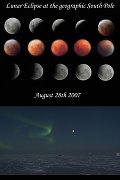
|
Robert Schwarz,
Amundsen Scott-South Pole Station
Aug. 28, 2007 |
#1,
more |
The lunar eclipse
seen from the geographic South Pole. The 6 months night
is coming to an end and it's getting quite bright. The moon
was only about 10 degrees above the horizon. For a series
of pictures over the period of the eclipse we could only
set up the camera in a heated observation room for the UV
contents of the atmosphere. Since the outside temperature
was about -68C (-90F). Therefore the long exposed pictures
a bit blurry due to warm air rushing outside. Also we are
looking through a lot of atmosphere. Some weak auroras showed
up as well.
Photo
details: Canon
Digital Rebel and Rebel XT, 1600 ASA, f8, exposure times
vary. |
|

|
Yuichi Takasaka,
Kalamalka Lake, Okanagan, British Columbia, Canada
Aug. 28, 2007 |
#1,
#2, more |
I had 2 digital cameras set up for this big event. One with 24mm lens for time lapse images and another one with 300mm lens for the close up images.
|
|
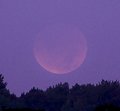
|
Jim Fakatselis,
Cold Spring Harbor, Long Island, NY
Aug. 28, 2007 |
#1,
more |
Fully eclipsed
Moon was just above horizon as sun was rising.
Photo
details: Canon
Digital Rebel XT, ISO 1600, 1/15s, Canon 300mm f/4L
@ f/4 |
|
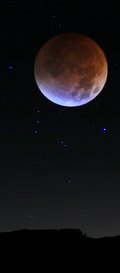
|
John Chase,
West of Denver, Colorado, USA
Aug. 28, 2007 |
#1,
more |
I usually get
caught in clouds or like last March the umbra phase is not
visible in my area. Not this time. Of course I paid for
it with a lack of sleep...
Photo
details: Multiple image (single exposure) with
Canon
20D at 300mm for the first part of the exposure, then
about 17mm after a lens swap blackout pan over to Orion
for the curtain (background) at f6.3, color temperature
in the cool range. This technique works because the area
behind the moon in the background is not bright enough to
disrupt the original exposure after the second lens is positioned.
EXIF says 134 seconds but I'd guess about 25 seconds effective
open lens time. |
|
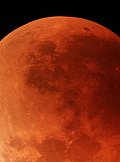
|
Dennis Mammana,
Borrego Springs, California, USA
Aug. 28, 2007 |
#1,
#2, more |
I've been photographing
lunar eclipses for 39 years but, suspended against the starry
desert sky, this TLE was easily the most beautiful I've
seen.
Photo
details: Canon
20D attached at prime-focus to an 80mm f/6 University
Optics refractor. |
|
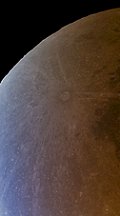
|
Ted
Phillips,
Canyon Lake, Texas
Aug. 28, 2007 |
#1,
#2, #3,
more |
This series
shows the progression of the moon under the penumbra into
totality. One shot shows the brilliant turquoise color of
the sun shining through the Earth's ozone layer and onto
the moon.
Photo
details: Captured with a Rebel
XT through an f/4 800mm Meade LXD75 SN8. |
|

|
Morris Maduro,
Riverside, California, USA
Aug. 28, 2007 |
#1 |
We had great
seeing of the entire event from Riverside, California. This
montage is of five separate images taken through a Meade
ETX-90EC with a Canon
350D at prime focus, composited in Photoshop. This scope
is a small Maksutov-Cassegrain, but it does the job nicely.
I've been observing and photographing lunar eclipses for
25 years, and this was the very first time I've had a completely
unobstructed view of an entire lunar eclipse. |
|
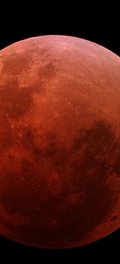
|
Andrew Cooper,
Mauna Kea, Hawaii
Aug. 28, 2007 |
#1,
more |
The darkest eclipse I have seen in quite a while. Shared the view with a few hundered others at the Visitor Information Center at Mauna Kea. When we got tired of the eclipse some observers took advantage of the totality to showcase many deep sky objects as if there was no Moon in the sky.
We could also see the latest lava flow from Kilauea with a bright lava river lighting the low hanging clouds.
What a night!
|
|
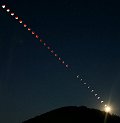
|
Brian Klimowski,
Flagstaff, AZ
Aug. 28, 2007 |
#1 |
Beautiful eclipse! One of the darkest I've seen...wonderful clear skies here in Flagstaff for the event!
|
|

|
Richard McCoy,
Mead, Colorado, USA
Aug. 28, 2007 |
#1,
#2, #3,
more |
It was a very
colorful eclipse that was very deep at totality.
Photo
details: Takahashi FSQ-106ED, Nikon
D70s, 200 ASA |
|

|
Paul Haese,
Adelaide, South Australia
Aug. 28, 2007 |
#1,
more |
Well another
great event, lovely colour and lovely sky. Was interesting
to see stars blink in and out of occultation.
Photo
details: Nikon
D200 400mm VR lens with 2x converter |
more
images: from
Daisuke Tomiyasu of Kobe, Hyogo, JAPAN; from
Blake Wylie of Nashville, Tennessee; from
Friedrich Deters of LaGrange, North Carolina; from
Mihir N.Devare of Oxford, Ohio; from
Rob Carew of Melbourne, Australia; from
Bill Shaffstall of Mesa, Arizona; from
George Varros of Mount Airy, Maryland; from
Robert B Slobins of Lake Hefner, Oklahoma; from
Todd Lindley of Lubbock, Texas; from
John Kirchhoff of Hudson, Michigan; from
Evelyn Lockwood of Frankfort, KY; from
Dr Owen Bateson of Susanville, California; from
George Fleenor of Bradenton, Florida; from
Andrew Ling of Taipei, Taiwan; from
Luc Jamet of Mexico City; from
Geoff Sims of Manly - Sydney, Australia;
|
|